Faster internet service has been switched back on 37 hours into its suspension.
The 3G and 4G service have been resumed at 10:00am, a spokesperson with the Bangladesh Telecommunication Regulatory Commission (BTRC) told The Daily Star this morning.
Most of the private telecommunications operators also confirmed about it.
The services were switched off at 9:00pm on December 30 (election day) three hours after restoring the mobile internet.
During the period, people were not able to use the internet on their phones, stream or upload pictures or videos.
This the third time the telecom regulator shut down the 3G and 4G services in last two days.
According to the BTRC, there were 8.78 crore active internet connections in the country as of June this year and mobile phone connections accounted for 93.43 per cent.
As of November of 2018, over 6 crore people are currently using the 3G and 4G mobile internet.
According to BTRC data, there were 57.35 lakh broadband connections in November.
On December 26, the BTRC in a meeting with the International Internet Gateway representatives said social media sites, especially Facebook, would be blocked if needed.
BTRC in the night of the following day slowed down mobile internet by shutting down 3G and 4G services. However, the service was restored on Friday morning 10 hours into its suspension.
3G, 4G back on

Related News
The newly elected parliament members will be sworn in tomorrow and the new cabinet may take oath on Sunday.
A number of ministers informed this to journalists yesterday.
Talking to reporters during a dialogue with Bangladesh Secretariat Reporters Forum, Information Minister Hasanul Haq Inu said the newly elected MPs would be sworn in tomorrow.
VIEW THE ELECTION DETAILS HERE
The government would formally announce the date, he said at the media centre of his secretariat office.
The gazette on the MPs-elect was published yesterday.
The minister also said the Jatiya Party would be the main opposition in parliament. “The party can also take part in the new government if the prime minister offers them and they accept it.”
Inu said the Awami League-led Grand Alliance is the people's alliance and it has won the national election by a huge margin as it has tried to work for the people.
About the rejection of polls results by the BNP, Inu said the party did so as “part of its conspiracy”.
Seeking anonymity, a senior AL minister told The Daily Star that the new cabinet would be sworn in on Sunday.
However, AL General Secretary Obaidul Qauder yesterday said the process to form the new government was likely to be completed by January 10.
Quader, also the road transport and bridges minister, was talking to reporters after placing wreaths at the portrait of Bangabandhu in front of Bangabandhu Memorial Museum in the city's Dhanmondi.
“After the oath-taking of the new MPs, Prime Minister Sheikh Hasina will meet the president. The president will then request the prime minister to form the government.”
Asked about the Jatiya Oikyafront's decision not to take oath, Quader said, “The Election Commission will deal with the issue. Everything will be done according to the constitution. If any candidate fails to take oath, the Election Commission will take necessary steps in line with the constitution. A new schedule will be announced for holding a by-election in that constituency.”
The minister said he still believed the Oikyafront, led by the BNP, would not “disobey the people's verdict”.
“Earlier, they had made a mistake by boycotting the 2014 general election. Whether they are satisfied or dissatisfied [with the polls results], it is their party's matter. But I hope those who have been elected MPs this time will not show disrespect to the people's verdict by not taking oath.”
The minister said many democratic countries have started congratulating Prime Minister Sheikh Hasina. “If they [BNP] do not participate in the democratic process, it will not remain halted.”
Quader urged AL leaders, activists and supporters not to be revengeful to the opposition men and behave with them carefully.
In the December 30 parliamentary, the AL-led Grand Alliance won 288 seats against the BNP-led Oikyafront's seven.
Three independent candidates also became victorious.
The election in Brahmanbaria-2 was suspended as voting at three polling centres was suspended over violence. Polling in those centres will be held on January 9.
Polls in Gaibanda-3 were rescheduled for January 27 following the death of a candidate.
Jatiya Party Chairman HM Ershad, who declared himself the leader of the opposition in parliament, now wants the status of a deputy prime minister. But such a post does not exist.
The leader of the opposition now enjoys the status of a minister. If it is to be given the deputy prime minister's status, the constitution first needs to be amended to create the post.
“I will request the new government to formulate a law to upgrade the post of the opposition leader to deputy prime minister. I will place the proposal in parliament. I will also speak to the Speaker [of parliament] in this regard,” he said, while talking to reporters after taking oath as an MP at the Jatiya Sangsad Bhaban.
Speaker Shirin Sharmin Chaudhury administered the oath at her office in parliament yesterday.
Ershad has been elected MP from Rangpur-3.
Twenty-two JP MPs-elect, except Ershad, took the oath as lawmakers of the 11th parliament on January 3. The JP chief could not take the oath due to illness.
After taking the oath yesterday, Ershad went to the room designated for the leader of the opposition at the Jatiya Sangsad Bhaban.
Sitting on the chair of the opposition leader, he told reporters that he was proud of taking oath as the opposition leader.
The former military ruler said he would request the government to elect the deputy speaker from the opposition MPs.
Ershad, who grabbed the state power in March 1982 by ousting the elected government of President Justice Abdus Sattar, said he would also request the government to upgrade the post of the opposition whip.
He said he would also urge the government to appoint more opposition MPs as chiefs of different parliamentary standing committees.
“We want to play the role of a strong opposition party in parliament. We will play our role following the rules of procedure in parliament. We will not boycott the parliament like the previous opposition parties,” he said.
JP Secretary General Moshiur Rahman Ranga told reporters that Ershad would be the first male in the last 27 to act as the leader of the opposition.
Just a day after the JP Parliamentary Party decided to join the Awami League-led grand alliance government, Ershad on January 4 came up with a completely opposite decision.
The JP chairman in a statement announced that his party would be the main opposition in parliament with no representation in the new cabinet.
Ershad, who was forced to step down from the president post following a mass movement in December 1990, also announced that he would act as the leader of the opposition and his younger brother and JP co-chairman GM Quader would be the deputy leader of the opposition.
Talking to this newspaper, several JP lawmakers termed Ershad's decision funny and arbitrary.
Earlier on January 3, JP Parliamentary Party unanimously decided that since JP contested the election under the banner of the AL-led grand alliance, they would join the government.
Sources at the Parliament Secretariat said Speaker Shirin Sharmin has yet to take measures to recognise Ershad as the opposition leader.
Ershad's wife, Raushan Ershad, was the leader of the opposition in the 10th parliament.
In the December 30 polls, the AL-led grand alliance secured 288 seats. JP, a key component of the alliance, bagged 22.
The BNP-led Jatiya Oikyafront managed to win only seven seats, while independent candidates got three.
The election in Gaibandha-3 was rescheduled for January 27 following the death of a candidate, and re-polling will take place at three centres in Brahmanbaria-2 on January 9.
The JP became the main opposition in the 10th parliament formed after the 2014 election, which was boycotted by the BNP-led alliance.
The JP in that election won 34 seats and its senior leader Raushan Ershad was recognised as the leader of the opposition. Three JP MPs were also made ministers.
Their dual role has been criticised. The party could not play its due role as the main opposition in parliament in the last five years.
Public property means the "public's" property – it doesn't belong to any individual or political party. But recent examples tell a different story. The ruling Awami League is going to create an extraordinary example in a soon-to-be-held rally in Rajshahi, where a special train has been earmarked for this occasion. The question is: can a political party use a national asset in this way?
It must be clarified that even though we criticise politicians and the parties they represent, at the end of the day, we have to – or want to – go to them for solutions. It's a proven fact that when politicians lead a country through a political process, the country benefits the most. There are ample examples of how non-political forces steer a nation, with Pakistan being a prominent example; a country that is on the verge of bankruptcy. Comparatively, India has no fewer internal problems. But as they are ruled by a politician-led democratic process, they have still managed to create a strong footing.
Our everlasting hope is that political parties will govern Bangladesh through a proper, acceptable and independent election. Unfortunately, as time goes by, a gross lack of equality, justice and good governance is gaining institutional acceptance.
The Daily Star Bangla reported that the Awami League will hold a rally in Rajshahi Madrasa Public Speaking Ground on January 29. This is a rally organised by the political party AL, and not by the AL government. Still, a special train has been arranged for this "political party's" rally.
Now, why is this a problem? What harm is there in arranging a special train for those attending a specific party's rally?
Well, firstly, why should there be a special arrangement for this, when there aren't even enough trains to service the general populace, and when the passenger to train ratio is quite low?
Secondly, can we recall what the ruling party's attitude and the transport situation were like when the BNP tried organising a rally in Rajshahi? Last year, on September 28, BNP announced that they would organise a rally in Rajshahi on December 3. Before it, a transport strike was called in eight districts of the division, and enforced from 6am on December 1. In fact, the strike was underway even before its stipulated starting time.
This strike saw the ceasing of movement for all kinds of vehicles, including buses, trucks and three-wheelers. Rajshahi was virtually cut off from all adjacent districts. Thus, it became very hard for BNP leaders and activists to join the rally from neighbouring districts. It was evident that the transport strike was devised in order to impede BNP supporters from attending. Although the government announced that the strike was called by transport owners and that they had nothing to do with it, any conscious being can gauge that the reality was the contrary.
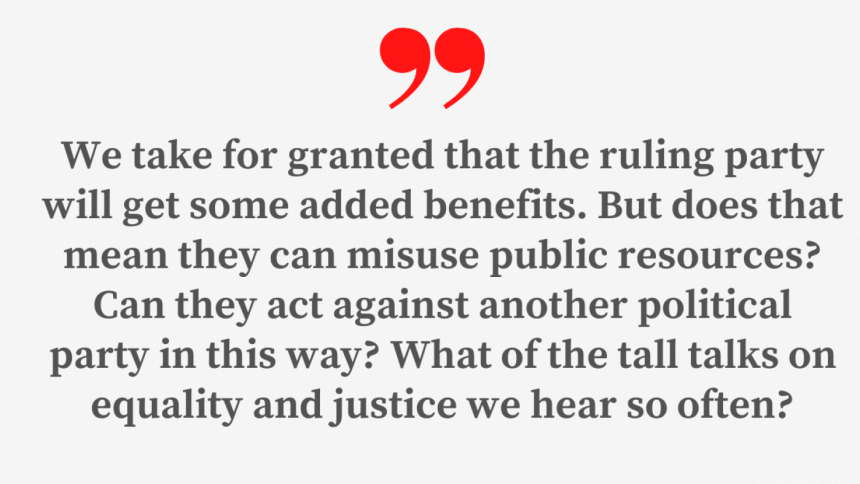
At one end, we see people being actively prevented from attending a BNP rally using transport strikes, police checkposts being put up every couple of kilometres, and BNP leaders'/activists' homes being raided, and them being arrested. On another end, special trains are to be arranged for the AL's rallies. Why should two political parties of the same nation receive polar opposite treatments?
We take for granted that the ruling party will get some added benefits. But does that mean they can misuse public resources? Can they act against another political party in this way? What of the tall talks on equality and justice we hear so often?
When there's a BNP rally, 3G and 4G services for mobile networks are usually halted around the venue. But the government doesn't even bother to explain the reasons behind this. On December 3, 2022, Rajshahi did not have 3G and 4G services. Queries revealed that the BTRC had given a "directive" to carry this out.
Did the BTRC's directive only harm and deprive BNP leaders and activists? Did not the general population also suffer? When the transport strike prevented BNP supporters from travelling between districts, were they the only ones affected? Did the whole region consist of BNP supporters, leaders and activists? Is there any explanation for such government actions, which cause the people to suffer?
It can be uncomfortable to have these pointed out, but even when we do, the government pays no heed. When a political party is elected by the popular vote, but then becomes an authoritarian regime, getting re-elected via night votes and voter-less polls, the general people start feeling bitter towards said party. People start comparing such political governments with military dictatorships, which is by no means a positive sign for our politics, or for politicians in general.
The ruling AL's politicians claim they have no aspirations of holding on to power and that they do not want any personal achievements, either – they simply want to serve the public.
Undoubtedly, serving the public is a good deed. But what kind of "service" do people get when their mobile networks are disrupted? Do transport strikes serve the people? What does "serving the people" actually mean to the ruling party? Does it mean only serving their own leaders, activists and supporters? Aren't opposition party affiliates a part of this country, too? Don't they also deserve to be served by the government?
People are losing voting rights, they cannot cast votes during polls, the prices of essentials are skyrocketing – and the government seems to be taking no notice. Ignoring the public's pleas, it is instead increasing the prices of fuel, gas and electricity. Each development project is seeing a cost increase, which is affecting the economy. We are experiencing an acute US dollar crisis and yet, money laundering persists. The government is not even taking effective steps against people who have been found responsible for causing these issues.
I want to end this piece with an example. Back when the military dictator HM Ershad was in power, the 15-party alliance led by the AL, seven-party alliance led by the BNP, and the five-party leftwing alliance, participated in a unified protest. Then, Ershad, who lost all popular support, stopped production in Adamjee Jute Mill and brought in 15,000 to 20,000 workers to join his rallies. That initiated the eventual doom of Adamjee Jute Mill. Later, the BNP came to power and shut down this mill, which once was bursting with potential.
Bangladesh Railway is already riddled with injustice, anomalies, and corruption. Have we considered what ill fate might befall the BR if such political usage of trains, as mentioned above, becomes a recurring trend?
Golam Mortoza is the editor of The Daily Star Bangla.
Awami League General Secretary Obaidul Quader today said BNP has failed to plunge the December 30 national election into controversy even after knocking at the doors of its foreign friends.
“They (BNP) wrote letters to different countries to make the election questionable but their motive has gone in vain,” Quader, also the minister for Road Transport and Bridges, told reporters after visiting construction site of the second Kanchpur Bridge on Dhaka-Chattogram and Dhaka-Sylhet highways in Narayanganj’s Sonargaon upazila.
BNP also completely failed to ensure momentum of their anti-government movement as people did not take to the streets by responding their call, the Awami League leader said.
Replying to a query about BNP’s decision to refrain from participating in the upcoming upazila elections, the minister said no political parity can sustain without taking part in election.
He said the heads of different countries including UK and Switzerland welcomed Prime Minister Sheikh Hasina following the formation of government under her leadership for the fourth time.
Claiming that people would not throng the streets responding to the BNP’s call, Quader said BNP is engaged in negative politics and thus it will lose its foreign friends as well as the trust of the countrymen.
Two Gonoforum lawmakers-elect yesterday wrote to the Speaker expressing their willingness to take oath on March 7.
Sultan Mohammad Monsur and Mokabbir Khan, presidium members of Gonoforum, took part in the December 30 national election as Gonoforum candidates, with the BNP's electoral symbol “sheaf of paddy”.
Asked about the matter, BNP Secretary General Mirza Fakhrul Islam Alamgir told The Daily Star that he did not know anything about the letter.
Senior Gonoforum leaders said they would take all kinds of actions against the two leaders if they took oath disobeying the party's decision.
Just around a month before the national election, the BNP, the Gonoforum and some other political parties had formed Jatiya Oikyafront.
Oikyafront leaders, including Dr Kamal Hossain, boycotted the polls results and called for a new election.
The BNP won only six seats against 289 by the ruling Awami League-led Grand Alliance.
All the six MPs-elect of BNP decided not to join the Jatiya Sangsad.
Talking to this newspaper, Sultan Monsur yesterday said Dr Kamal knew about their oath.
Mostafa Mohsin Montu, general secretary of Gonoforum, said the two leaders would violate the party's decision if they took oath.
“Our party has decided not to send the two MPs to parliament. We will take all necessary actions if they take oath.”
Montu also said the duo was misleading people by giving false statements.
If they took oath violating the party's decision, the Gonoforum would write to the Speaker to cancel their memberships for floor-crossing, he said.
Former Awami League leader Sultan Mansur, also an ex vice-president of Ducsu, was elected MP from Moulvibazar-2 and Mokabbir from Sylhet-2.
Soon after the December 30 election, the duo said Kamal was positive about their joining parliament.
On January 31, Kamal told journalists that the Gonoforum has informed the two about its decision that they should not take oath.


 For all latest news, follow The Daily Star's Google News channel.
For all latest news, follow The Daily Star's Google News channel. 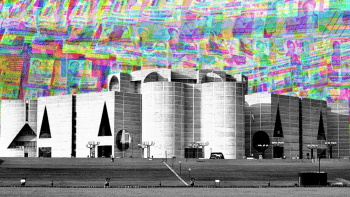
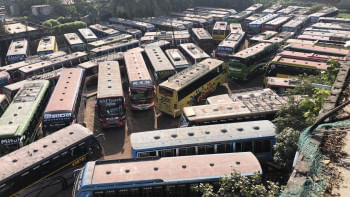

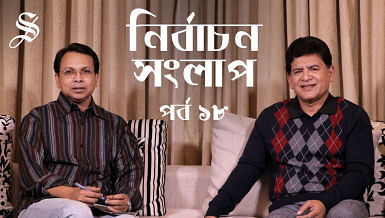
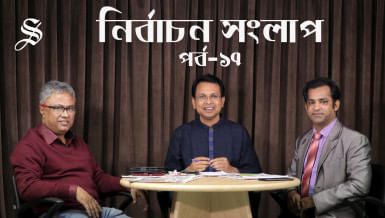
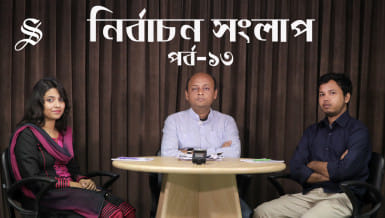
Leave your comments